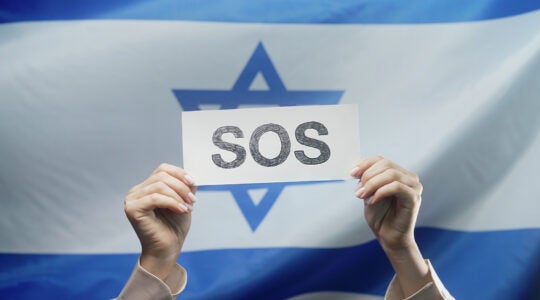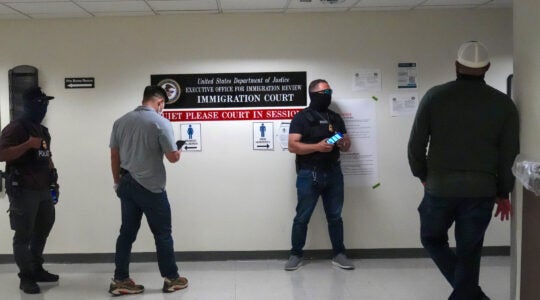Editor’s Note: Following is an excerpt from the rabbi’s message to his congregants in the wake of a controversy that arose over the draft of an itinerary for a planned, 15-day, 2017 Israel trip that included a stop at the grave of Yasir Arafat.
Shakla vetarya (give and take) is a venerable method of rabbinic learning and investigation, and something I apply to all inquiry. To me, this is the baseline of being Jewish — and comprises the core of my living in sacred connection to our traditions. With this trip scheduled for 2017, part of a series of congregational visits to Israel every other year, I hoped to have meaningful dialogue with well-meaning participants about the aspects of the itinerary that challenged them and that made people uncomfortable. That was the point. The entire itinerary was a thought experiment.
I looked to empower people to join with me to decide which experiences they would have, as we partnered in creating the itinerary together – and with the collective effort, a goal was to show the dangers that Israel and her people constantly face, every day. In addition to a potential stop at the tomb of the terrorist Yasser Arafat (ym’sh, yimach sh’mo yazikro, Hebrew for “may his name be blotted out”) that has been criticized, other elements of this draft itinerary included: experiencing the Tel Aviv Gay Pride Parade, sharing time with residents in an overnight stay in the disputed territory of Har Bracha in Samaria (West Bank), visiting with Jewish, and non-Jewish residents of Hebron, and visiting Isha l'Isha — the Haifa Feminist Center, the oldest grassroots, feminist organization in Israel, and one of the leading voices of women's rights in the country.
Now, in partnership with synagogue leadership and other community members, we are revising the entire itinerary as we anticipate our summer 2017 journey to Israel.
I categorically reject and condemn Yasser Arafat and his insidious legacy. To suggest or insinuate otherwise is immoral and defamatory.
In our tradition, we have intractable enemies. While we blot out Haman's name on Purim, we do so as we paradoxically articulate it. We must find allies and must not retreat into absolute positions. To be present somewhere is not to pay homage — rather it is to say we are still here, reclaiming the memories of those who Arafat and his followers murdered, and educating others about the continuing dangers of his legacy. This tomb is a propaganda tool that is used to shore up mindless support for our dehumanization. In turn, not to discuss this stymies dialogue, which leads to our peril. To think otherwise empowers our real enemies and continues to drive us apart, intensifying our systemic, historical traumas. Let us not fall into that trap.
While I appreciate the work of many Jewish organizations across the political spectrum who strive for ahavat Yisrael (love of Israel), the following are organizations of which I am actually a member, or which I support: Jewish National Fund (JNF) — Rabbis for Israel, AIPAC, Shalom Hartman Institute, where I am a Senior Fellow, Rabbis without Borders, Institute for Jewish Spirituality — Hevraya, Interfaith Action of Central Texas (IACT), where I serve as president, Texas Freedom Network — executive board, Rabbinical Assembly, and the Cantors Assembly.
Day after day, I speak to people who are concerned about the slackening of support, and the growing difficulty of advocacy for Israel in our charged, polarized political climate. We see the dangerous way that the repugnant BDS movement (Boycott, Divest, and Sanction against Israel) has made incursions on our college campuses. I applaud and support those on the front lines, directly beating back efforts that seek to delegitimize Israel and dehumanize our Israeli brothers and sisters.
I believe that we must do something, too. We must learn the language of those with whom we disagree — especially those with whom we most profoundly disagree. We must see the narratives, symbols, and myths — and question them. We must develop a more sophisticated, critical understanding of the world around us, as opposed to reducing our justified fears to an "us vs. them" mentality. We must learn to think for ourselves and not accept whatever we may read that encourages embitterment and distance. We must learn to have more informed, examined opinions and hear competing voices so we may be more fully confident and present in our own story.
I am sorry that a proposed stop in an internal draft document has caused such furor. While it was a point of conversation within a larger itinerary, I certainly do not seek public controversy and upon reflection, I see it as a misstep in what I was seeking to accomplish.
In all that I do, I seek to be a convener of positive leadership. I seek to inspire each of us (and especially our youth) not to be afraid to ask difficult questions so we may outwit those who seek to divide and use negative tactics to gain power. We need each other — each of us resolute in our quest to support a strong and secure Jewish and democratic state.
Am Yisrael Chai.
Neil F. Blumofe is rabbi of Cong. Agudas Achim in Austin, Texas.
Pull quote:
I categorically reject and condemn Yasser Arafat and his insidious legacy. To suggest or insinuate otherwise is immoral and defamatory.
The New York Jewish Week brings you the stories behind the headlines, keeping you connected to Jewish life in New York. Help sustain the reporting you trust by donating today.




